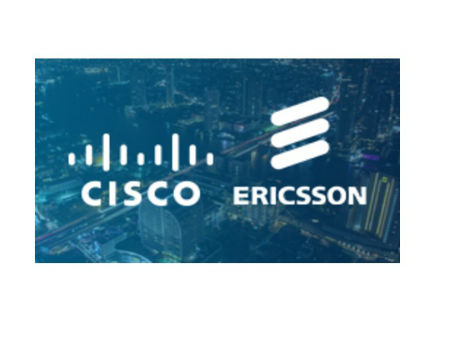Ericsson-Cisco Deal Puts Pressure on Network Rivals
The smarter way to stay on top of the multichannel video marketplace. Sign up below.
You are now subscribed
Your newsletter sign-up was successful

A far-reaching technology and business relationship forged by Ericsson and Cisco Systems will focus on next-gen networks and wired/wireless convergence and virtualization, but it also spells trouble for several of their networking rivals.
“[W]e think this news bodes negatively for competitors and partners, including Alcatel-Lucent, Nokia, Juniper and Ciena,” Raymond James analyst Simon Leopold said in a research note issued Monday in the wake of the Ericsson-Cisco agreement.
Investors seem to agree, at least with respect to Juniper, whose shares were down 7.88% in mid-day trading Monday. Feeling less of the brunt was Ciena (down 1.85%), Alcatel-Lucent (down 0.86%), and Nokia (down 1.46%). Ericsson shares were up 1.35%, and Cisco’s were down 1.09%.
Leopold said the new relationship makes business sense for Ericsson-Cisco, in some of the same ways it does for the pending merger between Alcatel-Lucent and Nokia.
“Both companies (Cisco and Ericsson) bring intellectual property and R&D to the table,” Leopold said. “ Cisco's greatest strengths lie in software, switching and routing, along with its powerful enterprise channel, and Ericsson brings strength in wireless, services, and telco network management."
While he is optimistic about the partnership, which ties together similar challenges and objectives, Leopold warned that many such arrangements have not panned out. Juniper and Ericsson have been partnered up for several years, but have “suffered after Ericsson acquired Redback,” he pointed out.
On a call Monday to discuss the deal in more detail, top execs with Cisco and Ericsson highlighted the incremental growth opportunities it presents, and focused less on how the agreement will impact existing partnerships with other vendors.
The smarter way to stay on top of the multichannel video marketplace. Sign up below.
Ericsson and Cisco have been in discussions about the deal for about 13 months, with a “significant acceleration” in those talks in the last six months, Cisco CEO Chuck Robbins said, noting that Ericsson’s service reach (65,000 people in that group) complements Cisco’s much smaller 11,000. “It’s very much about looking out ahead of what’s in the markets and dramatic transformation of networks and IT.”
“This is a big bet for both of us,” added Ericsson president and CEO Hans Vestberg.
Both Vestberg and Robbins will have management oversight of the partnership, which aims to create an additional $1 billion in incremental for each company by 2018.
Why not just merge the companies? Robbins said partnership was the best way to accelerate the goals that the companies can bring to the table with their respective products and technologies.
“We think that this brings the innovation from both sides and allows us to move now. It allows us to absolutely deliver solutions to our customer immediately”
Vestberg agreed that Ericsson had options to build, buy or partner to fulfill its longer-term missions, “and partner was the only way forward in order to make it efficient.”
“We believe this is the right move for us, right now,” Robbins added.
Vestberg said Ericsson’s existing vendor partnerships will remain intact, and views the Cisco deal as a growth opportunity that will also enable the company to broaden its portfolio.
